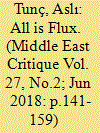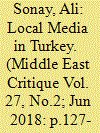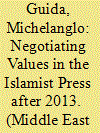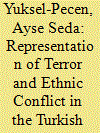|
|
|
Sort Order |
|
|
|
Items / Page
|
|
|
|
|
|
|
| Srl | Item |
| 1 |
ID:
159240


|
|
|
|
|
| Summary/Abstract |
Since 2002, when the Justice and Development Party (AKP) came to power, the media in Turkey have undergone significant transformation. Drawing on the historical background of Turkish media and including the coup attempt on July 15, 2016, this article focuses on the changing role of newspapers and television channels, as well as the journalism profession. In-depth interviews lead the way to an analysis of the media sector’s function at the intersection between clientelism, authoritarian tendencies, and capitalist market rules. The concept of ‘hybridity’ used for this study offers a theoretical framework for discussing how Turkey fits into the model of competitive authoritarianism and Andrew Chadwick’s hybridity media framework.
|
|
|
|
|
|
|
|
|
|
|
|
|
|
|
|
| 2 |
ID:
159239


|
|
|
|
|
| Summary/Abstract |
Since the Justice and Development Party (AKP) came to power in 2002, the greater visibility of religion and the emergence of a conservative middle class have reconfigured the boundaries of what is thinkable and sayable in Turkey, particularly in the media. Despite its importance to media consumers, academic analysts have marginalized radio compared with television and the press. Yet increasing commercialization and local concentration have affected mainstream music radio and reshaped religious broadcasting. This article focuses on local radio in the periphery. How does the radio landscape in Central Anatolia, a region reflecting the conservative bourgeoisie’s new dominance, mirror and link to the dominance of the AKP? Fieldwork conducted in Konya, one of the Anatolian ‘Tigers’ and a centre of AKP support, provides the empirical data for this case study.
|
|
|
|
|
|
|
|
|
|
|
|
|
|
|
|
| 3 |
ID:
159243


|
|
|
|
|
| Summary/Abstract |
Turkey’s Islamist press has been influenced essentially by three contingencies: partisanship, lack of political autonomy, and lack of economic autonomy. These contingencies are reflected in the opinion pieces of Islamist columnists, five of whom are examined here in detail. To understand how their opinions are shaped, this article focuses on their interpretations of two dramatic events: the Gezi Park protests and the December 17–25 corruption scandals, both of which took place in 2013. This analysis provides a granular look at how the different Islamist columnists produced highly contrasting responses to government policies and choices, giving a unique insight on the intellectual dynamics within the Islamist community as the July 15, 2016 coup approached.
|
|
|
|
|
|
|
|
|
|
|
|
|
|
|
|
| 4 |
ID:
159244


|
|
|
|
|
| Summary/Abstract |
This article explores the representation of the Kurdish issue in Turkey’s media. It does so by focusing on four newspapers that are representative of different ideological stances and economic relations with the Turkish government. The time period is during two key events: the Kobanî protests in 2014 and the elections in 2015. The research findings indicate that the media’s framing of the armed conflict between the Turkish state and the PKK is a contested discursive site; one determined not only by ideological affiliation but also by the relative politico-economic autonomy of the media institutions from the central political power.
|
|
|
|
|
|
|
|
|
|
|
|
|
|
|
|
| 5 |
ID:
159241


|
|
|
|
|
| Summary/Abstract |
This article focuses on AKTrolls, defined as pro-government political trolls in Turkey, while attempting to draw implications about political trolling in the country in general. It examines their methods and effects, and it interrogates whether (and how) Turkish authorities have attempted to shape or counter politically motivated social media content production through trolling after the Gezi Park Protests that took place in 2013. My findings are based on an ethnographic study that included participant observation and in-depth interviews in a setting that is under-studied and about which reliable sources are difficult to find. The study demonstrates political trolling activity in Turkey is more decentralized and less institutionalized than generally thought, and is based more on ad hoc decisions by a larger public. However, I argue here that AKTrolls do have impact on reducing discourses on social media that are critical of the government, by engaging in surveillance, among other practices.
|
|
|
|
|
|
|
|
|
|
|
|
|
|
|
|
| 6 |
ID:
159238


|
|
|
|
|
| Summary/Abstract |
Turkey has been undergoing a transition in governance over decades, most recently in the sociopolitical transformation from Kemalist laicism to Islamic-dominated politics. The shifts have been uneven, with government frequently overtaken by military control, and then returned to some form of democratic functioning, with associated changes in the laws reflecting greater or lesser tolerance for multi-party politics, public religious practice, and EU-inspired civic liberties. Throughout, the experience has engaged a tension between Western influences and Islamic norms as interpreted through processes of modernization and economic liberalization. The media’s role as a conveyor of cultural imaginaries and national identities has led it to play an important part in this trajectory. Yet, although its autonomy has varied depending on those in power—at times being a tool entirely controlled by government, at others operating with few fetters—the laws and regulations surrounding the media have varied much less, suggesting the legal structure defining Turkish media reflects in general terms the public’s view of its position and role in society. This is despite the fact that the media laws in Turkey have not been holistically forged, nor rigorously updated to accommodate technological change. What is suggested here is that the media’s status as a strategic circulator of ideas within social relations and as an ideological bellwether of public values, has been translated into the legal corpus, creating a uniquely Turkish interpretation of the media’s agency, and instrumentality, which we suggest is made comprehensible through Values and Status Negotiation Theory (VSN).
|
|
|
|
|
|
|
|
|
|
|
|
|
|
|
|
| 7 |
ID:
159242


|
|
|
|
|
| Summary/Abstract |
Following the AKP’s second election victory in 2007, significant changes to the party programme and strategy evolved into the ‘New Turkey,’ a new, more abstractly defined discursive and operational space. This both redefined democratic practices and generated a backlash to gender equality and the status of women. As media is a powerful hegemonic tool, where political actors compete for influence, analysis of television daytime talk shows reflects similar gender role-making processes within Turkish society. We study one of the most popular shows in Turkey, hosted by Seda Sayan through ‘discursive governance’ and in which political actor discourses influence the public agenda through active sense-making, a process in which the media plays a critical disseminating and legitimating role, particularly in restrictive political settings. We argue that the show (now no longer broadcast) was a locus of discursive governance. Identity and habitus in the ‘New Turkey’ discourse strategically were projected in such shows, rendering formal policy change to affect behavioral shifts unnecessary. Seda Sayan’s show thus expressed a conservative and gendered public normative narrative, one that the AKP government has developed into a dominant normative order.
|
|
|
|
|
|
|
|
|
|
|
|
|
|
|
|
|
|
|
|
|